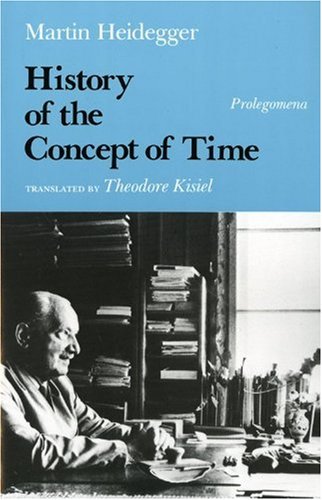

Most ebook files are in PDF format, so you can easily read them using various software such as Foxit Reader or directly on the Google Chrome browser.
Some ebook files are released by publishers in other formats such as .awz, .mobi, .epub, .fb2, etc. You may need to install specific software to read these formats on mobile/PC, such as Calibre.
Please read the tutorial at this link. https://ebooknice.com/page/post?id=faq
We offer FREE conversion to the popular formats you request; however, this may take some time. Therefore, right after payment, please email us, and we will try to provide the service as quickly as possible.
For some exceptional file formats or broken links (if any), please refrain from opening any disputes. Instead, email us first, and we will try to assist within a maximum of 6 hours.
EbookNice Team

Status:
Available4.5
12 reviews
ISBN 10: 0253207177
ISBN 13: 978-0253207173
Author: Martin Heidegger
Heidegger's lecture course at the University of Marburg in the summer of 1925, an early version of Being and Time (1927), offers a unique glimpse into the motivations that prompted the writing of this great philosopher's master work and the presuppositions that gave shape to it. The book embarks upon a provisional description of what Heidegger calls "Dasein," the field in which both being and time become manifest. Heidegger analyzes Dasein in its everydayness in a deepening sequence of terms: being-in-the-world, worldhood, and care as the being of Dasein. The course ends by sketching the themes of death and conscience and their relevance to an ontology that makes the phenomenon of time central. Theodore Kisiel's outstanding translation premits English-speaking readers to appreciate the central importance of this text in the development of Heidegger's thought.
Introduction
The Theme and Method of the Lecture Course
§ 1. Nature and history as domains of objects for the sciences
§ 2. Prolegomena to a phenomenology of history and nature under the guidance of the history of the concept of time
§ 3. Outline of the lecture course
PRELIMINARY PART
The Sense and Task of Phenomenological Research
Chapter One
Emergence and Initial Breakthrough of Phenomenological Research
§ 4. The situation of philosophy in the second half of the 19th century.
Philosophy and the sciences
a) The position of positivism
b) Neo-Kantianism-the rediscovery of Kant in the philosophy of science
c) Critique of positivism-Dilthey's call for an independent method for the human sciences
d) The trivializing of Dilthey's inquiry by Windelband and Rickert
e) Philosophy as 'scientific philosophy'-psychology as the basic science of philosophy (the theory of consciousness)
a) Franz Brentano
β) Edmund Husserl
Chapter Two
The Fundamental Discoveries of Phenomenology, Its Principle, and the Clarification of Its Name
§ 5. Intentionality
a) Intentionality as the structure of lived experiences: exposition and initial elucidation
b) Rickert's misunderstanding of phenomenology and intentionality
c) The basic constitution of intentionality as such
a) The perceived of perceiving: the entity in itself (environmental thing, natural thing, thinghood)
β) The perceived of perceiving: the how of being-intended (the perceivedness of the entity, the feature of bodily-there)
y) Initial indication of the basic mode of intentionality as the belonging-together of intentio and intentum
§6. Categorial intuition
a) Intentional presuming and intentional fulfillment
a) Identification as demonstrative fulfillment
β) Evidence as identifying fulfillment
y) Truth as demonstrative identification
8) Truth and being
b) Intuition and expression
a) Expression of perceptions
β) Simple and multi-level acts
c) Acts of synthesis
d) Acts of ideation
a) Averting misunderstandings
β) The significance of this discovery
§ 7. The original sense of the apriori
§ 8. The principle of phenomenology
a) The meaning of the maxim "to the matters themselves"
b) Phenomenology's understanding of itself as analytic description of intentionality in its apriori
§9. Clarification of the name 'phenomenology'
a) Clarification of the original sense of the component parts of the name
a) The original sense of phenomenon
b) Original sense of logos (logos apophatikos and logos important)
b) Definition of the unified meaning thus obtained and the research corresponding to it
c) Correcting a few typical misunderstandings of phenomenology which stem from its name
Chapter Three
The Early Development of Phenomenological Research and the Necessity of a Radical Reflection in and from Itself
§10. Elaboration of the thematic field: the fundamental determination of intentionality
a) Explication of the demarcation of the thematic field of phenomenology and fixation of the working horizons in Husserl and Scheler
b) Fundamental reflection upon the regional structure of the field in its originality: elaboration of pure consciousness as an independent region of being
§11. Immanent critique of phenomenological research: critical discussion of the four determinations of pure consciousness
a) Consciousness is immanent being
b) Consciousness is absolute being in the sense of absolute givenness
c) Consciousness is absolutely given in the sense of 'nulla re indiget ad existendum'
d) Consciousness is pure being
§12. Exposition of the neglect of the question of the being of the intentional as the basic field of phenomenological research
§13. Exposition of the neglect of the question of the sense of being itself and of the being of man in phenomenology
a) The necessary demarcation of phenomenology from naturalistic psychology, and its overcoming
b) Dilthey's endeavor of a 'personalistic psychology'-his idea of man as a person
c) Husserl's adoption of the personalistic tendency in the "Logos-Essay"
d) Fundamental critique of personalistic psychology on a phenomenological basis
e) Scheler's unsuccessful attempt in determining the mode of the being of acts and of the performer of acts
f) Result of the critical reflection: the neglect of the question of being as such and of the being of the intentional is grounded in the fallenness of Dasein itself
history of the concept of time
prolegomena to the history of the concept of time
heidegger history of the concept of time
heidegger history of the concept of time pdf
martin heidegger history of the concept of time
Tags: Martin Heidegger, the Concept, Time Prolegomena